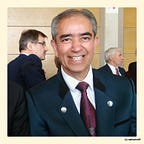NEPALI- MAOISTS- GURKHAS ( Satis Shroff )
‘Nepali stands at the end of a long string of dialects stretching along the foothills of the Himalayas, its nearest neighbour being Kumaoni; but, like the others, it has been open to the influence of the language of the Tarai and the Plains of the South. In it too we see the development of a purely local dialect, of the district of Gorkha, into the language of administration for a whole kingdom…Nepali is a sturdy, vigorous tongue, capable of poetry–you have your poets–and of strong, simple, nervous prose. Hindi is one language, Nepali is another. Do not let your lovely language become the pale reflection of a Sanskritised Hindi.’ (Courtesy: Sir Ralph L.Turner, concluding an address delivered at the British Embassy, Kathmandu, on the occasion of the coronation of His majesty King Mahendra Bir Bikram Shah Deva, 1955).
Well it’s almost 2022 now and the nation has seen the emergence of the Maoists in a decade long Himalayan civil-war in which a great many Nepalese were injured or died. Revolutions, kranti, have always ended with thousands of dead on both sides and this has been recorded in history books and ducumentary films. The Shah family have been ousted from the Narayanhiti Palace, which has been turned into a national museum, and this once forbidden kingdom is now a federal republic. In 2021, Nepal dealt with the economic and domestic uncertainties of the ongoing pandemic. Like anywhere else on the globe, Nepal struggled to overcome the effects of the coronavirus pandemic.
The domestic politics of Nepal saw a huge upheaval as Prime Minister K.P. Sharma Oli was forced out of office through a landmark Supreme Court verdict that catapulted Nepali Congress President Sher Bahadur Deuba to the post for the fifth time . In Nepal’s international relations, most of the government’s diplomatic efforts were concentrated towards securing vaccines against COVID-19. The pandemic has taken more than 11,000 lives so far and its toll is being gradually felt in Nepal’s economy. The change in government may not be enough to solve Nepal’s problems as political stability and good governance will be key factors in facing challenging times in the future.
What remains are the old wounds and trauma of a nation that’ll take time to heal. To this end I’d like to wish my former countrymen and women all the best. The best thing you can do for your children is to give them a good education, and not a khukri.
This was denied to generations of Gurkhas by the former British governments because they practiced a policy of non-inclusion in the daily life of Britain and treated them as merely mercenaries that you could hire-and-fire at will. It is heartening to note that the Gurkhas and their families are being gradually integrated in the British society in police and security forces, and also in civilian life, like the other members of the Commonwealth, which were Britain’s former colonies.Nepal had a so-called special relationship and was subtly excluded from the Commonwealth. Some ‘special relationship’ indeed, the consequence of which had to be shared by generations of Nepalese children who lost their Dads who died under the Union Jack and for the glory of England.
When an injured soldier wanted medical treatment due to injuries that occurred while fighting for England’s glory they were denied medical treatment by the MoD and NHS in England. No, Britain didn’t want Gurkhas with gerontological problems either. What a discriminatory solution for cheap fighting men from the Himalayas. It’s only in recent times that the Gurkhas have started going to court and winning legal battles against the formidable, heartless, bureaucratic MoD based in London. The different government and the Prime Ministers as well as the Monarchs and, of course, MoD have been giving each other the blame for the misery of the Gurkhas instead of bringing out a plan for the welfare of the Gurkhas and their families. Instead of allowing the Gurkha children and the same right as the political regugees and asylum seekers in the United Kingdom, the powers that be have given the Gurkhas a no-benefit status in its civilian life. The Gurkhas were brought to the Gurkha brigades just to fight England’s foes outside the country as cheap labourers-at-arms, whom you could hire and fire at the will of the British officers. If there was a small quarrel or revolt at the wrong-doing of the officers, it was the Gurkhas who were sent to their home country. Protests were not heard of. A Gurkha was expected to fight and the thinking was supposed to be the right of the British officers. The olde colonial set-up. Even officers who should have opened their mouths didn’t comply as they feared promotion in their ranks; they were scared of being court marshalled.
And yet these very officers played polo, went to the officer’s clubs, drank gin, expensive scotch and talked about their ‘brave, courageous, fearless, blood curdling Gurkhas.’ They just didn’t seem to realise that even Gurkhas are humans who had wishes and desires like any other mortals, who had families and dependents in the craggy hills of their mountainous country. With the support of both Opposition parties and Labour rebel MPs on 29 April 2009 a Liberal Democrat motion that all Gurkhas be offered an equal right of residence was passed, allowing Gurkhas who served before 1997 residence in the UK.I heard a Scottish lady who’s father was a Gurkha officer say, “Oh, the Gurkhas shouldn’t protest. If they do that they’ll be sent back to Nepal.”
This is the standard punishment meted out to loyal friends and “special relationships.” I’ve never witnessed such hypocracy anywhere in my life. Dankeschön. So much for the still colonial master-servant relationship between the Brits and their Johnny Gurkhas.
